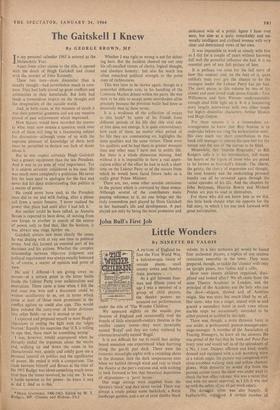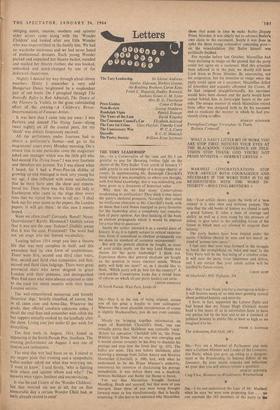John Bull's First Job
Little Wonders
By•NINETTE DE VALOIS
A PICTURE of England be- fore the First World War, a kaleidoscopic vision of seaside places; small county towns and Sunday
train journeys. . .
We appeared nightly on the seaside pier theatres of England and occasionally trod the boards of little nineteenth-century theatres in the smaller county towns—they were invariably named 'Royal' and they are today replaced by cinemas invariably named 'Regal.'
It is not difficult for me to recall that spring- board sensation one experienced when hurrying along the gas-lit pier deck. There were the romantic moonlight nights with a twinkling shore in the distance, then the dark tempestuous ones when we battled through wind and rain to reach the theatre at the pier's extreme end, with nothing to look forward to but that theatrical depression of depressions—a 'poor house.'
Our stage settings were supplied from the theatre's 'stock' and they never varied. There was always a crude palace scene backcloth, a florid landscape garden, and a set of tired shabby black velvets. In a tiny orchestra pit would be found four orchestral players, a replica of any teatime restaurant ensemble in the town. They were prepared, though, to tackle the 'classics' with only an upright piano, two violins and a cello.
How were twenty children organised, disci- plined and looked after? We all came from the same Theatre Academy in London, and the principal of the Academy was the lady who ran the show—elegant, shrewd and of Austrian origin. She was strict but much liked by us all. Her sister, who was a singer, toured with us and graced a secondary hotel in each town whose marble steps we occasionally ascended to he either praised or scolded by this lady.
There was, though, a more dynamic force in our midst; a professional general-manager-cum- stage-manager. A member of the Association of Touring Managers, he knew all the answers. He was proud of the fact that he 'took out' Peter Pan every year and would tell us of the splendours of a No. 1 tour. Dapper, efficient and kind; neatly dressed and equipped with a soft homburg worn at a rakish angle; the picture was completed with silver-knobbed walking stick and yellow chamois gloves. With dexterity he would slip from the prompt corner (once the show was under way) to check the box office takings; this was a move that met with my secret approval, as I felt it was tied up with the safety of my £4 per week salary.
The dom4tic scene was also happily, if haphazardly, orgatted. A certain number of obliging aunts, cousins, mothers and spinster elder sisters came along with the 'Wonder Children' and looked after any little Wonder who was impoverished in the family line. We had no wardrobe 'mistresses and we had never heard of professional dressers. Each young Wonder packed and unpacked her theatre basket, mended and washed her theatre clothes; she was hooked, unhooked and quick-changed by one of the dedicated chaperones.
Nightly I danced my way through about eleven numbers. Dimly I remember a very odd Hungarian Dance heightened by a resplendent pair of red boots. On I ploughed through The Butterfly Ballet (a Red Admiral), The Dance of the Flowers (a Violet), to the great culminating effort of the evening—A Children's Revue: impersonations of Famous Artists.
It was here that I came into my own: I was Pavlova and danced The Dying Swan—dying twice nightly on all the coastal piers, for my `death' was always ferociously encored.
All the performers under fourteen had to obtain a performer's licence—and go to the magistrates' court every Monday morning. On a return visit to one particular town the magistrate asked our manager which was the little girl who had danced The Dying Swan? I was over fourteen and therefore not present. Yet I was elated when I heard, for I had a Peter-Pan-ish dislike of growing up and managed to look very young for my age. I also reflected with some satisfaction that he must have seen the show and remem- bered me. Then there was the little old lady at Eastbourne who came to the stage door every time that we visited the town to tell me: 'I shall look out for your name in the papers, the London papers. It will get there.' In this case 1 merely hoped. . . .
Were we often tired? Certainly. Bored? Never. Quarrelsome? Rarely. Homesick? Guiltily aware that it was not the case. Jealous?, Guiltily aware that it was the case. Frustrated? The word had not yet crept into our limited vocabulary.
Touring before 1914 swept you into a theatre life that was very complete in itself, and this awareness had its own form of snobbishness. There were first, second and third class tours, first, second and third class companies, and first, second and third class lodgings. There were great provincial stars who never deigned to grace London with their presence, and distinguished West End stars who were always expected to take to the road for many months with their latest London success.
The well-remembered numerous and homely theatrical 'digs.' Strictly classified, of course, but in all cases cozy and home-like. Whatever the grade, they offered comforts unknown today. I recall the coal fires and remember with relish the hot suppers actually cooked by the landlady after the show. Living cost just under £1 per week for everything.
The first week in August, 1914, found us appearing at the South Parade Pier, Southsea. The evening performance on August 3 was one of tension and restlessness.
The next day war had burst on us. I stared at my supper plate that evening and a sympathetic ballet-mother asked me what was worrying me. 'I want to know,' I said firmly, 'who is fighting with whom and against whom and why?' The answers were vague, hesitant and unconvincing.
1t was the end I knew of the 'Wonder Children,' but that worried me not at all; for on that memorable day a, certain Wonder Child had, as such, already ceased to exist:"



































 Previous page
Previous page